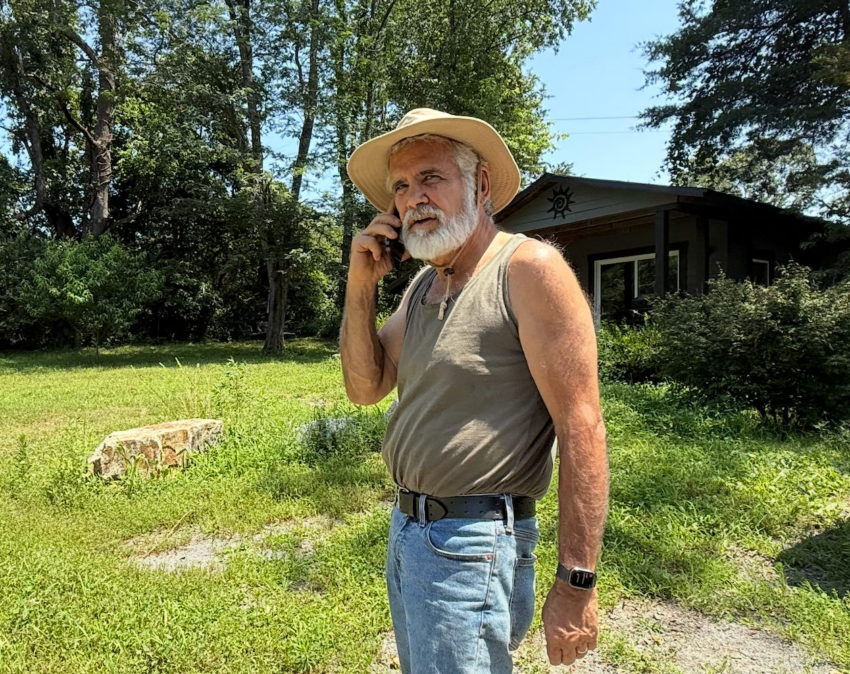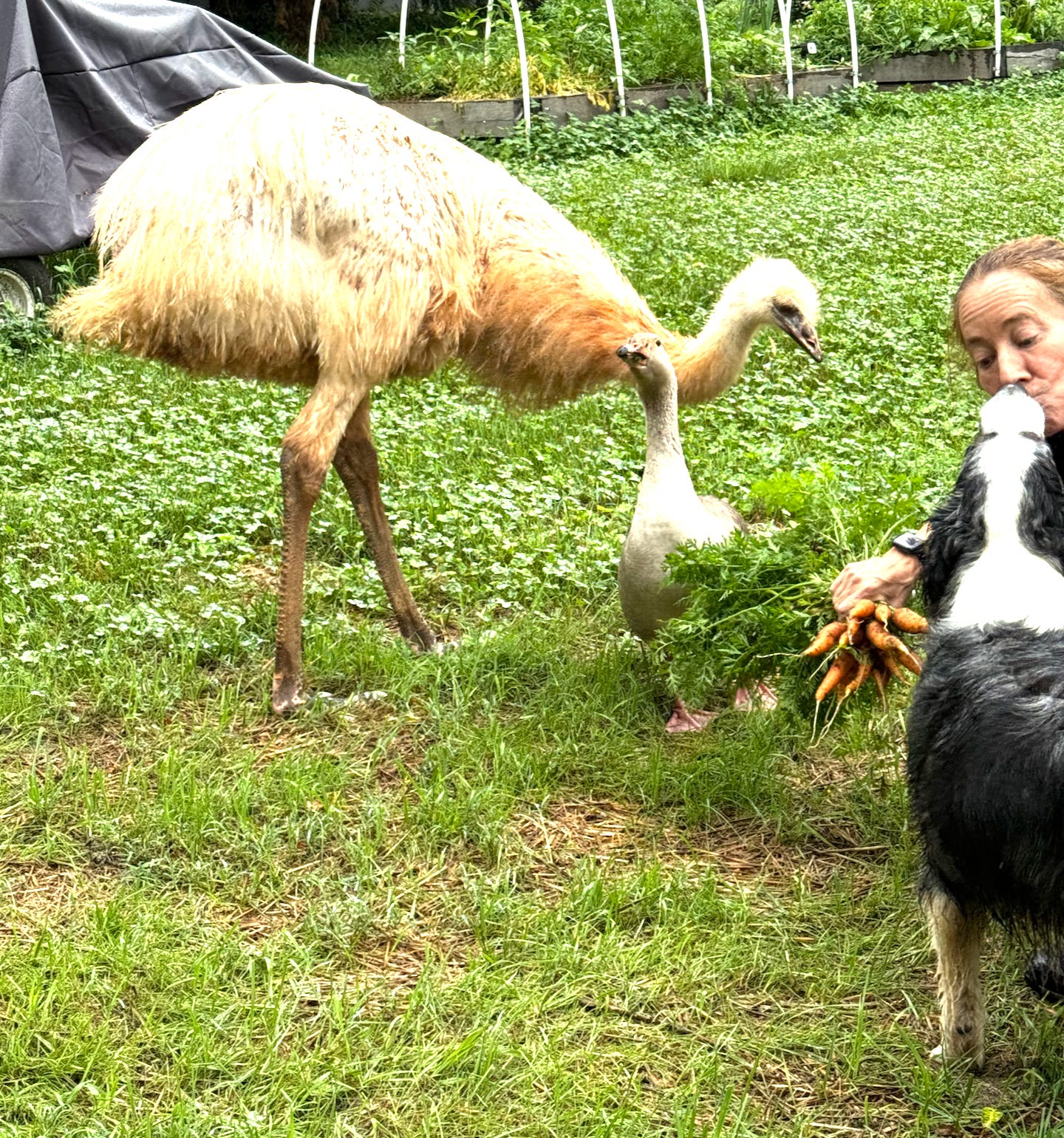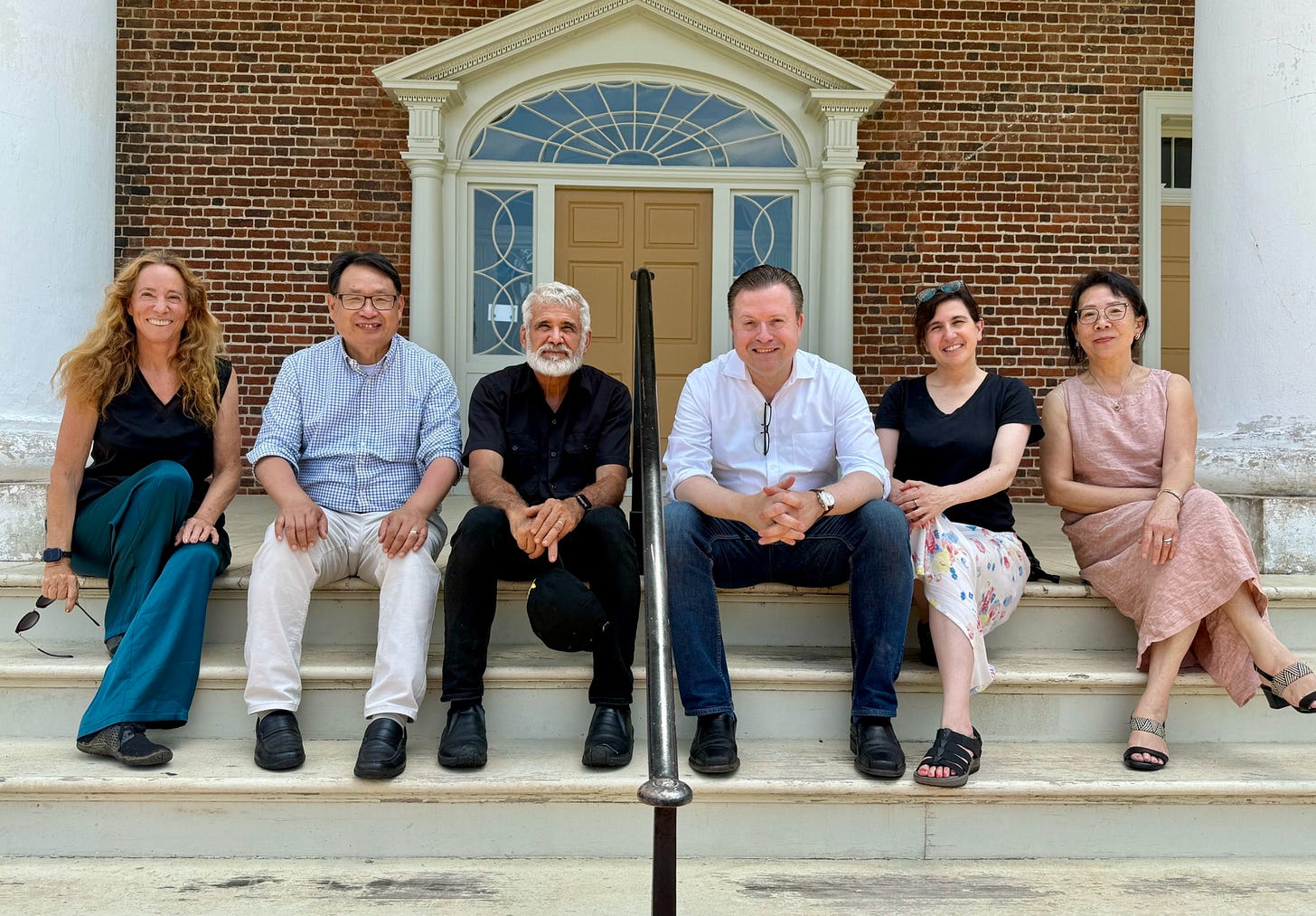Dr. Robert Malone:
In my opinion, the dog days of summer are the most challenging time of year for vegetable gardening.
All of a sudden, it feels like something between a sauna and the Sahara desert outside. Watering the garden and the horses now is a twice-a-day ordeal, and by the time we finish, our clothing, hair, and shoes are all soaked with either sweat or water, and we are covered with a fine sheen of wet dust.
Of course, as the phone rarely stops ringing these days with important calls, I end up with the cell phone glued to my ear, as I go about all the must-do chores that keep the animals and gardens alive.
Who’s jealous of a few little birds?
The first batch of carrots was a huge success this year, and the second crop will be ready soon.
Below is a series of photos showing Jill trying to induce Gizmo and Gonzo to try the carrot tops, but instead ending up with many, many dog kisses.
(Of note – Gizmo, Gonzo, Nina, Bella, and Oso have no interest in carrot tops, no matter how much Jill waved them around. But later, the chickens ate every bit of that greenery – with gusto). Around here, nothing goes to waste.
Visitors on the farm
As some of you may have read earlier, we had a farm full of guests from Wednesday through Sunday this week. Honestly, this fourth of July weekend was one of those gatherings of people here on the farm that I want to remember always. So much laughter, friendship, and intellectual discourse! So much good will. I am privileged to be surrounded by so many fine friends.
As we live in the great state of Virginia, where four out of the five first presidents of the United States originated, we have a wealth of historic houses here. So, the group of us toured James Madison’s home called Montpelier, about five miles from our homestead, on Saturday. Below, we are sitting on the steps of that historic place:
So there we were – some 250 years later, in Madison’s home, looking at the exact desk and at the view where he wrote the US Constitution (known first as the Virginia Plan) at Montpelier, Virginia. Madison credited this view of the Blue Ridge Mountains in the background of this photo as his muse for his writings, which formed the structural backbone of our legendary republic.
“Conscience is the most sacred of all property.”
-President James Madison
Over the week, we managed to prepare most of the food using eggs, basil (pesto), tomatoes, carrots, cucumbers, onions, and herbs from the gardens. Jill made bread, carrot cake, deviled eggs, pickled onions, pesto, salads, scrambled eggs, and more, all with ingredients grown here. The beef came from the Miller’s cattle farm (Ginger Hill) down the road. The lemons for the tea were grown in our greenhouse.
For some of those out-of-town guests, I’m not sure if they had ever experienced such cooking. It was a real treat to be able to serve our friends home-grown and home-cooked, organic food like that. Teaching people about homesteading and food is a great pleasure for us. The feeling that we are truly making a difference in people’s lives. That we are planting a seed that, while perhaps dormant now, may one day blossom into a passion for homesteading, similar to our own.
Who knows what the future will bring to our great land? However, as long as we maintain the skills and knowledge sets required for a small homestead, along with the necessary seeds and livestock, we will have what it takes to survive. If we or our children ever need to rely on ourselves to survive, it will be doable and even – dare I say it? Fulfilling. Or even maybe a better quality of life than many have now in our urban deserts.
One of the guests here this week is in the process of building a coop for her first hens. She has never had chickens before, so Jill spent a lot of time going over the basics. To us, keeping chickens seems so simple. But in fact, for people who have never cared for a flock of birds, it can be overwhelming. A while back, we wrote an article on chicken husbandry that may be of interest to those considering getting a flock of birds.
Summer Veg
The tomatoes and other summer vegetables have arrived in abundance. In years past, we have found that we can freeze raw, cherry tomatoes whole and then put them into either freezer bags or use a vacuum sealer to preserve them in the freezer to use during the off-season. Tomatoes that are frozen without being cooked can be used in recipes that use tomatoes, such as in Italian dishes.
However, Jill has since stopped using plastic bags for freezer storage, so this year she is putting the cherry tomatoes into mason jars. As there is a lot of air between the tomatoes, she didn’t bother leaving room at the top of the container. But when she makes tomato sauce to freeze, she always leaves an inch or more at the top of the jar for expansion.
That quart mason jar just went right into the freezer. Later today, she plans to make gazpacho. Yum!
A small idea to plant in your brain. When shopping for frozen vegetables, opt for those grown in the USA (ideally organic) or from a trusted country, such as Italy, that has stringent organic food regulations. We do not buy frozen vegetables from China.
Likewise, we buy cheese that is either local, from a source we trust, labelled organic or from Italy or some other trustworthy country, such as Switzerland, that does not use glyphosate or BGH.
Fat stores certain toxins, particularly those that are lipophilic (fat-soluble), such as persistent organic pollutants (POPs), including polychlorinated biphenyls (PCBs), dioxins, certain pesticides (which also include herbicides, as labeled by the USDA), and polybrominated diphenyl ethers. These chemicals are resistant to breakdown. So, they accumulate in the environment and in the mammalian body, especially in adipose (fat) tissue, because they dissolve easily in fat but not in water. When a cow or any animal produces milk, her body mobilizes these fat stores, and some of the stored toxins can be transferred into the milk.
Therefore, obtaining “clean” cheese is essential to maintaining good health.
Sweet potatoes –
The vines of the sweet potato are verdant and now sprawl all over the patio area. For those who follow this Substack closely, you may recall that Jill planted out two old stock tanks with sweet potato slips in the spring. We started these plants from last year’s sweet potatoes in the house, and now they have grown into a mound of dark green foliage. But even better, it turns out that with each new morning light, light purple flowers can be seen peaking out from behind the tangle of leaves. Then come evening, the sweet potato flowers close up and go to sleep.
Does that flower remind you of something?
It did me, and so I looked it up.
It turns out that sweet potatoes are closely related to morning glories. Who knew? I certainly didn’t!
This fall, we plan to take cuttings or develop more slips from the sweet potato tubers and see if we can fill the greenhouse with sweet potato vines—maybe even train them to grow into a viney wall.
I could go on and on, as there is so much going on around the farm. But you all have probably heard enough of my rambling. So for now, stay hydrated, and I hope you get to enjoy the rest of the day as much as I intend to.
Postscript – the bees are doing great and have been busy washboarding.
Washboarding is a distinctive and somewhat mysterious behavior observed in honey bees, especially among worker bees. During washboarding, bees align themselves in rows, typically on the hive’s entrance and rock their bodies back and forth in a synchronized motion. While doing this, the bees plant their four rear legs and use their two front legs to step forward and backward, often licking or scraping the surface beneath them.
There is no definitive scientific explanation for washboarding but theories include hygiene, communication, or temperature regulation. However, it is considered a sign of a stable and contended hive.
So good news all around!
Click this link for the original source of this article.
Author: Robert W Malone MD, MS
This content is courtesy of, and owned and copyrighted by, https://rwmalonemd.substack.com and its author. This content is made available by use of the public RSS feed offered by the host site and is used for educational purposes only. If you are the author or represent the host site and would like this content removed now and in the future, please contact USSANews.com using the email address in the Contact page found in the website menu.














